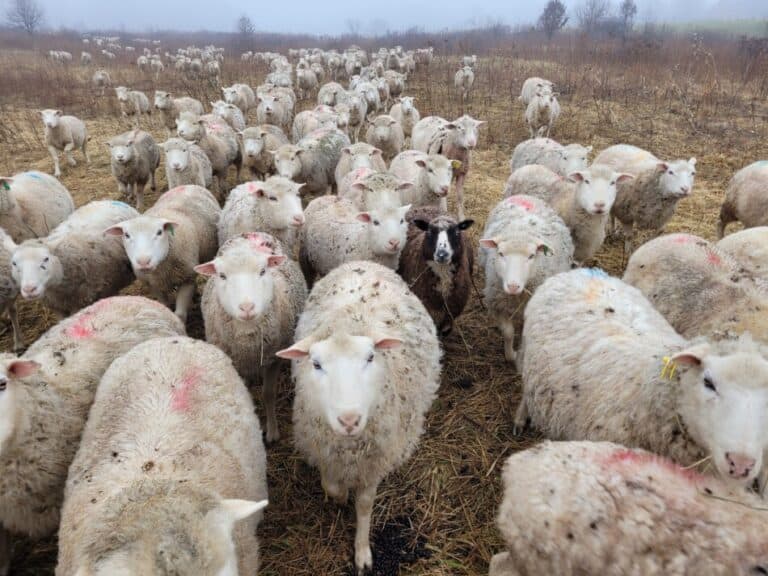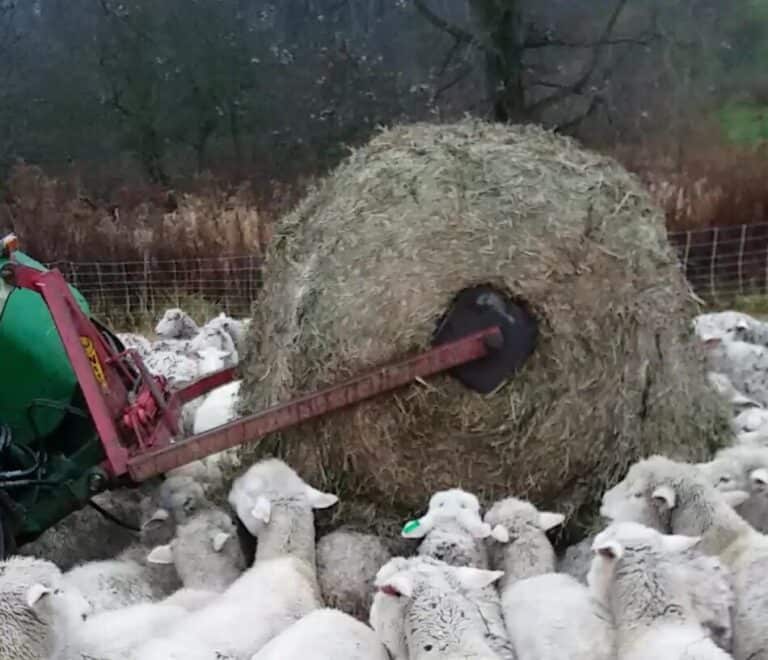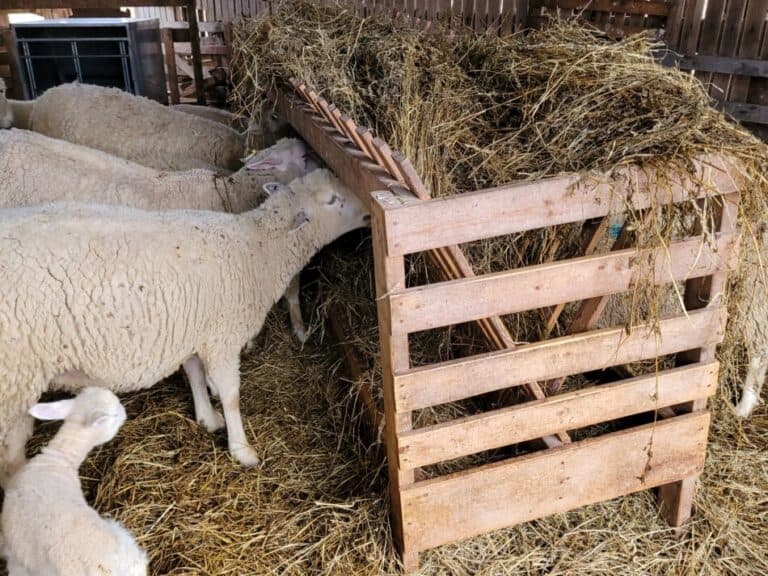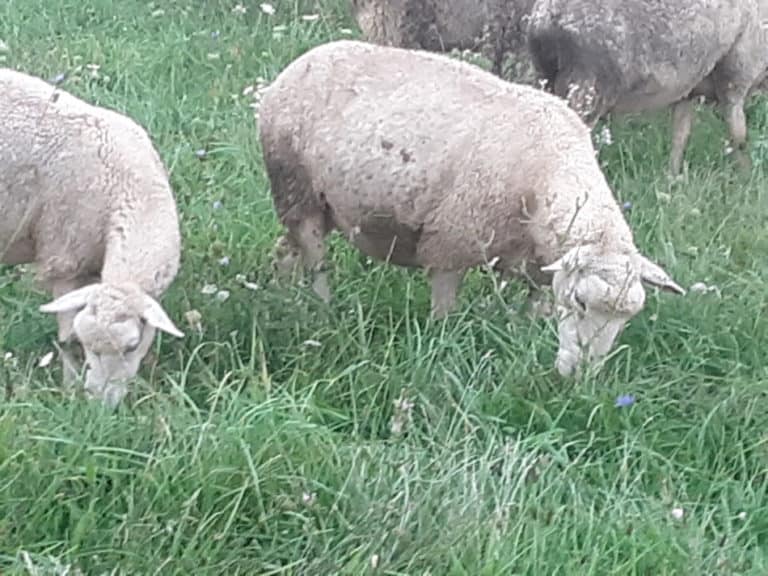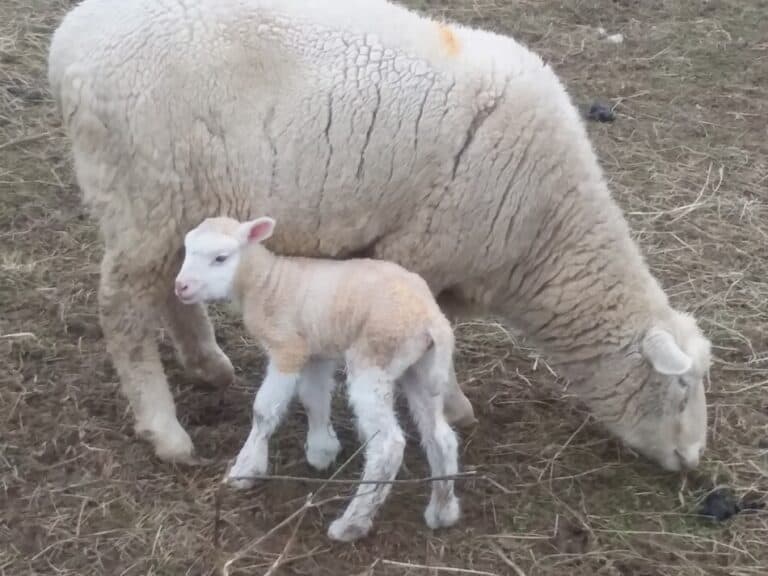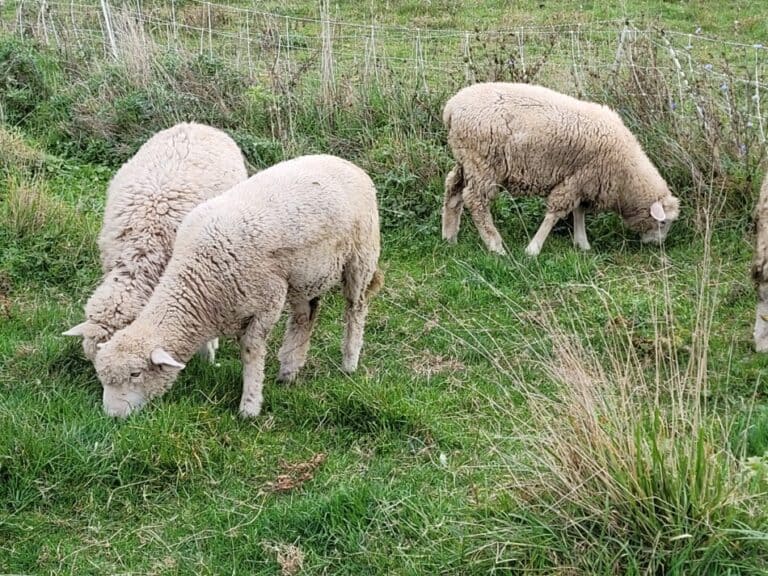Benefits Of Sheep Bells For Your Small Farm Flock
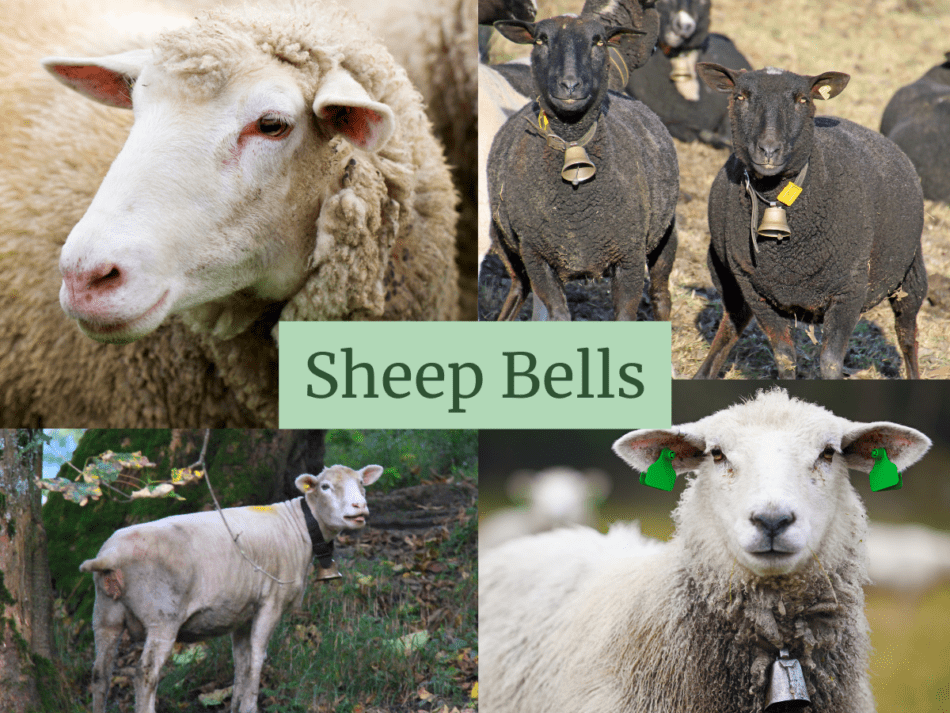
Sheep bells are something that I think of from movies like Heidi or videos of festivals, including traditional dress and activities, from villages in the mountains of Europe.
What about here, for everyday sheep owners? Are there practical reasons to have bells on your sheep?
The main benefits of sheep bells are that they provide a sound locator for the shepherd (or guard dogs) that instantly communicates where the sheep are and what they are doing in terms of normal or abnormal flock activity.
I was actually surprised to see people asking about bells for sheep.
I have seen videos of people and their animals decked out for festivals but never seen anyone use bells in everyday livestock care and management.
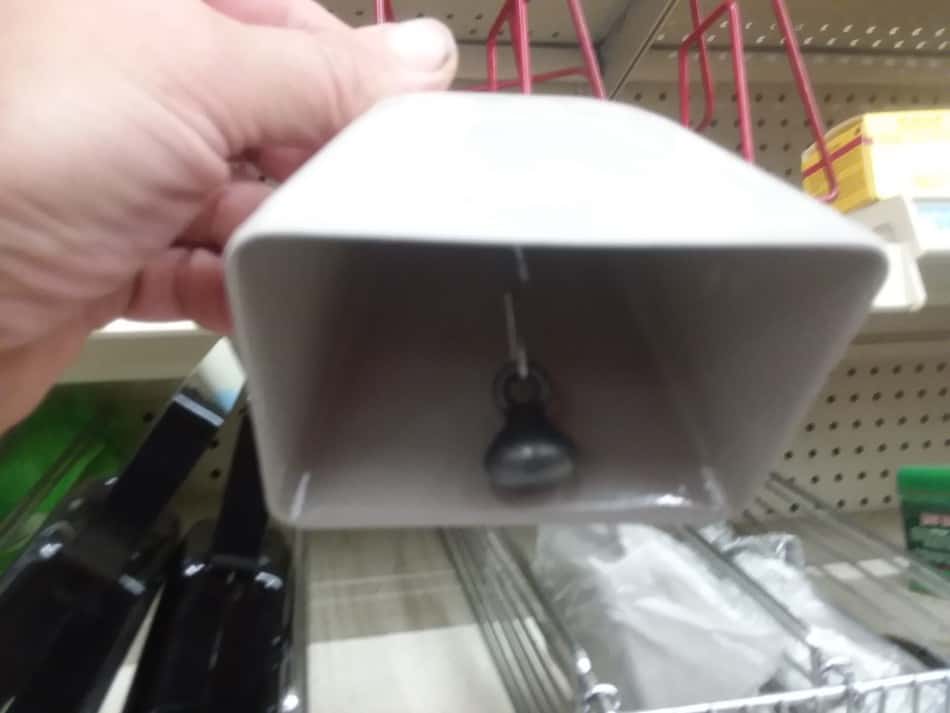
Although, I did notice our local farm store has a rather extensive selection of bells (like the one pictured above), so obviously many people are looking for them.
Easy Sheep For Beginners gives you our recommendations for sheep breeds that are versatile and beginner friendly.
Well, I have been missing out! Imagine my surprise when Premier 1 has an article on bells for sheep and goats!
Including how to use them and listing out two shepherds who currently use bells on large flocks in the western U.S. Here is the article on the Premier 1 website Benefits of Bells for Sheep and Goats
The significance of Premier 1 having the bells is that Premier sells sheep supplies for people who are raising sheep for profit.
They also have some show supplies, but their main focus is supplies, like electric fencing, for people raising livestock as a business. This means they have practical items.
Premier has sheep bells and they sell practical items for livestock owners. We have sheep but have never used or even seen anyone use bells.
That’s a pretty big disconnect. What have we overlooked?
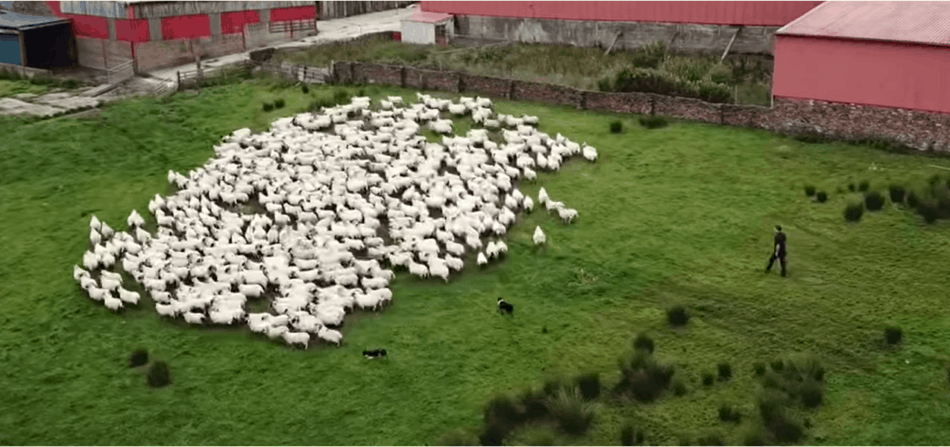
Sheep wear bells so you can find them
The short answer is so that you can tell where the sheep are located when you can’t see them.
A bit longer of an answer is that all sheep pastures or grazing areas are not open grass meadows.
Sheep are very adaptable and can graze all kinds of forages and terrain. Maybe you can see them up or over there, maybe you can’t.
In our part of the country (Ohio) the sheep would never be out of sight, unless they are wandering about in the neighbor’s yard!
We do not worry that a big part of the flock has wandered off and will get “lost”. We can see if all the sheep are in front of us or not.
In the huge range flocks this is not the case.
For anyone grazing sheep in heavy cover, like a shrubby area, or foraging silvopasture (woods or small trees), the sheep would be out of sight or hard to see more often than not.
There are five main reasons for sheep to wear bells:
- to easily determine their location
- assurance that they are in the area they are supposed to be in
- a warning of one of the sheep, especially rams, charging you
- sound changes based on sheep activity
- an easy predator deterrent
Sheep bells give you the location of the sheep
An easy one to explain. The beauty of the bells is the sheep can be found in hard to see conditions like fog or looking into the sun.
Pros And Cons Of Sheep is an overview of the good stuff and the not so good stuff that is all part of the package when raising sheep.
Assurance the flock is in the correct place
Again, obvious, but important. Now that I think about it, our farm is hilly enough in places this one would apply to us.
Depending on the pasture location, the sheep can be out of sight of the house and barn. Bells would save us some “I can’t see the sheep” walking.
Bells can be put on rams
Let’s be honest, the most likely one in the flock to give you a whack is the ram. Ewes can too of course, but they normally keep it to lambing time only.
Rams it’s anytime. Putting a bell on your ram would give you a bit of warning when he is headed your way.
Sound of bells tells speed of sheep
A grazing sheep will have a slower cadence and a milder tone to the ringing of the bell than a running sheep.
Not new information to you I’m sure, but speaking for myself, I never considered the value of the noise of the bell to give me information on sheep activity without me having to be right there with the sheep.
Another plus to bells, the noise change would also alert your guard dogs that something was up.
Sheep bells are a predator deterrent
Before it starts to seem like the bells will solve all of your sheep problems realize that the bells will not keep a determined predator away.
A flightly predator will scamper off, a thinker will figure it out with time. You will still need other deterrents to keep predators out of your sheep.
Purchase the sheep bells online
The closest place I know of for me is the local farm store in town. Be aware, like everything else, you get what you pay for.
Buy the cheap ones, anticipate them being poorly made and accept it or get higher quality bells, available online, that will last and perform for you.
I would check online for sheep bells and collars. You can get the bell and a collar for your ewe for about $10 total.
Current prices are $3.40 for the collar and $6.90 for a basic bell. The prettier or more elaborate bells will cost more.
I hate spending money on something then being disappointed because it didn’t hold up or it didn’t work like it was supposed to.
Save yourself the hassle and buy a high quality item the first time. More often than not, you will save money overall by spending more money at first.
What? The better quality bell will last and perform well, the cheapo one will not. You’ll have to get another (spend more) or just be mad and say “forget it” (and have wasted your money).
Bells stay on the sheep with a collar
The sheep would need to have a collar, similar to a dog collar, to hold the bell. The collar needs to be sturdy and well fitted, if you can slip your fingers under the collar it is put on right.
Not all collars will be able to attach directly to the bell, you may need to get another link to secure the bell.
If you have more of a classic belt style collar with the buckle and the holes, this will slip right through the space on top of the bell.
If you are thinking of using a more modern snap together style collar, you will need an additional link of some sort to attach the bell, since the snap together ends are too wide.
The best time to put on a collar for the bell? Right after shearing. Good news, since you had to catch the ewe for shearing anyway, might as well get the most use out of it!
How do I know the bells are working?
A working bell is one you can hear and is still on the sheep’s collar. That’s an easy answer, but what about the bell still on the collar yet no sound?
This bell needs looked at. It could be as simple as mud jammed up in the bell, so the little part that dangles, called the clapper, can’t swing around. Remove the mud and the bell works fine.
Nothing jammed in the bell? Try looking at the clapper itself. Is it still there? Is is swinging freely around as you move the bell?
On the poorly designed bells the clapper can jam up inside the bell and be stuck in place.
This is an easy short term fix but is going to cost you, in terms of problems, later, since this is likely to keep happening.
Does the ewe mind wearing a bell?
If she’s used to the collar, no. If the collar and bell are new to her, she’ll be testing it out to see if she can shake it off, then will get used to it being in place.
It’s not that she doesn’t like the bell, it’s that the bell is new to her. Once she is familiar with the feel of the collar and the sound of the bell, she won’t even notice wearing it.
How many bells do I need for my flock?
The number that I have run across is one bell for every 25 ewes. For anyone with less than 25 ewes, have as many bells as you want, or your budget will allow.
If you plan to use the bell for locating the flock, I would want to have 3-4 ewes with bells in the flock.
Why? Because things can happen to the bell, the collar or the sheep that would make your one locator sheep hard to locate.
A few likely examples: The collar comes off. You haven’t heard or seen the flock today so you go check into the situation and find the bell and collar, but no sheep.
Where are those sheep? Hard to say.
Or the ewe with the bell goes off to have her lambs. Her bell is working fine, she’s just not with the main group for the day. You can tell where she is but not the other sheep.
Having multiple bells spread throughout the flock insures that you will still be able to locate the sheep should something happen to one of the collars or bells.
An important note to readers
An important note: I realize this article, especially at the top, may look like an ad for Premier. It’s not.
I don’t get a dime from them for mentioning their name or referring you to them.
I buy their stuff all the time and will continue to buy from them because they are the best. You want good stuff for your sheep? Check them out.
